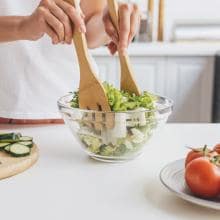Mum & Baby
Diet & breastfeeding
This article may help answer:
Why is diet important while breastfeeding?
What foods should you eat when breastfeeding?
Should I avoid any foods or drinks while breastfeeding?
Find out more:
Breastmilk alone allows your baby to grow and develop until around the age of six months when you should start to introduce solids.
As a new mum, eating healthily will support your breastmilk production and provide your baby with all the essential nutrients it needs to be able to thrive. Some important nutrients and where they can be found are:
If you’re breastfeeding exclusively you are technically eating for two. Just remember that one of you has a stomach about the size of a walnut so you don’t need to double your calorie intake.
If you’re feeling hungrier than usual reach for healthy snacks
Most women can produce plenty of breast milk by eating 1800-2200 (or more) calories per day. If you’re feeling hungrier than usual reach for healthy snacks – such as chopped vegetables, low fat yoghurt or fruit, and avoid high-fat, sugary treats that provide little nutritional value.
You’re likely feeling very thirsty so stay hydrated. Caffeine and alcohol can pass into breast milk so try to avoid them, and make water your main source of liquid.
A great breastfeeding diet minimises or avoids highly processed foods and instead features lean meat, fish, vegetable, fruits, whole grains and low fat dairy.
Although it’s unlikely to affect your baby if you get sick, this risk can be minimised by avoiding under-cooked meat, or foods which may be past their best. Your body needs all the vitamins and energy it can get during this demanding time so only eat food you feel has been prepared safely.
For a more detailed guide on what to eat while breastfeeding, a good source of information is the NZ Government's Health Ed website, which includes recommendations for breastfeeding women.






